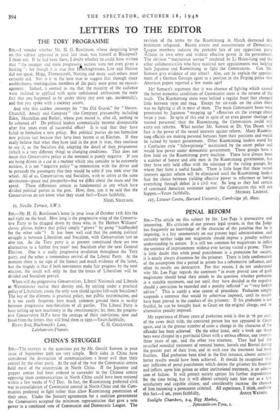PENAL REFORM
SIR.—The article on this subject by Mr. Leo Page is provocative and interesting. His criticism of our present legal system, in that the Judge has frequently no knowledge of the character of the penalties that he is imposing, is a fair commentary on our present legal administration, and certainly neither judge nor magistrate should impose a penalty without understanding its nature. It is still too common for magistrates to inflict the sentence of imprisonment Without ever having visited a prison. There is little doubt that while penal punishment is a protection for society, it is nearly always disastrous for the prisoner. There is little confirmation of the assumption that a period in prison has a reformative influence, and often its results are destructive. For that reason, I do not understand why Mr. Leo Page regards the comment " in every proved case of guilt magistrates should bend their minds to the question whether probation is a suitable treatment, and not until they have decided in the negative should a conviction be recorded and a penalty inflicted " as " very foolish
advice." This is surely a wise course of procedure. Probation simply suspends a sentence that would be otherwise imposed, until its results have been proved in the conduct of the prisoner. If his probation is not fruitful, he can be brought back to Court on the original charge, and an alternative penalty imposed.
My experience of fifteen years of probation work is that in 76 per cent. of the cases dealt with, the convicted person has 'not appeared in Court again, and in the greater number of cases a change in the character of the offender has been achieved. On the other hand, only a week ago three boys were charged in a provincial Court with a serious offence, one twenty- three years of age, and the other two nineteen. They had had the so-called remedial treatment of remand homes, hostels and Borstal during the greater part of their lives, and in each case the treatment had been fruitless. Had probation been tried in the first instance, almost certainly better results would have been achieved. It should be recognised that any infliction of penal punishment which denies the prisoner his freedom and inflicts upon him prison or other institutional treatment, is an admis- sion of failure. It will protect society against his further depredations for the time being, but it will almost certainly turn him out as a less satisfactory and capable citizen, and considerably increase the chances of him becoming a permanent criminal. All experience, I think, confirms this fact.—I am, yours faithfully, ANGUS WATSON.
Sunlight Chambers, 2-4, Bigg Market,
Newcastle-on-Tyne, 1.






























 Previous page
Previous page